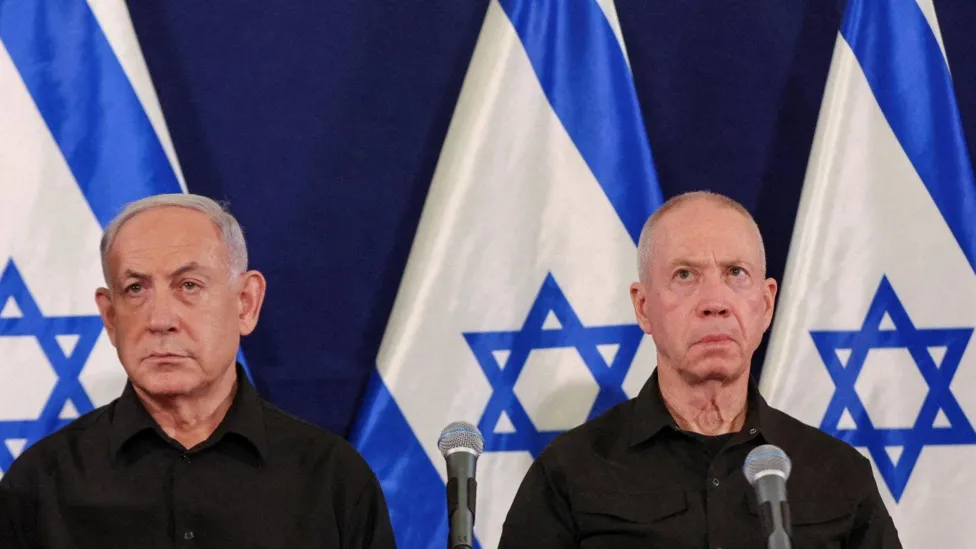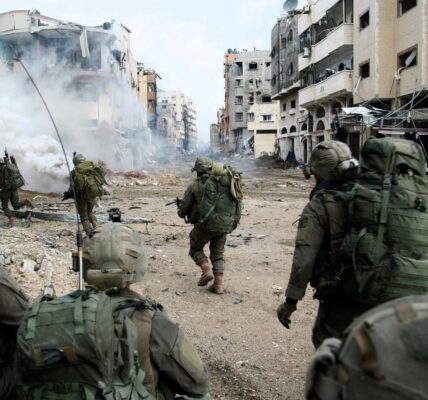
The decision by International Criminal Court (ICC) prosecutor Karim Khan to seek arrest warrants for Israeli Prime Minister Benjamin Netanyahu, Defence Minister Yoav Gallant, and three leaders of the Hamas organisation has ignited significant international backlash. On Monday, several of Israel’s closest allies, including the United States, the United Kingdom, Germany, the Czech Republic, and Austria, condemned the legitimacy and timing of Khan’s actions.
Netanyahu called the application for arrest warrants a “travesty of justice”.
Kahn has created “a twisted and false moral equivalence between the leaders of Israel and the henchmen of Hamas,” Netanyahu said. “This is like creating a moral equivalence after September 11th between President Bush and Osama Bin Laden, or during World War II between FDR and Hitler”.
US Leaders Condemn ICC Decision
US President Joe Biden slammed the ICC’s decision, calling it “outrageous.”
“Let me be clear: whatever this prosecutor might imply, there is no equivalence — none — between Israel and Hamas. We will always stand with Israel against threats to its security”.
Secretary of State Antony Blinken echoed these sentiments, fundamentally rejecting Khan’s decision and questioning the credibility of his investigation. Blinken criticised the prosecutor for not allowing Israel sufficient time to conduct its own ongoing investigations. He also highlighted procedural concerns, noting that the prosecutor had planned to visit Israel to discuss the investigation but instead announced the charges on television.
“We reject the prosecutor’s equivalence of Israel with Hamas. It is shameful. Hamas is a brutal terrorist organisation that carried out the worst massacre of Jews since the Holocaust and is still holding dozens of innocent people hostage, including Americans,” Blinken stated.
Blinken reiterated the long-held US stance that the ICC lacks jurisdiction over the Israeli-Palestinian conflict, emphasising that neither Israel nor the US are members of the Court.
“The ICC was established by its state parties as a court of limited jurisdiction. Those limits are rooted in principles of complementarity, which do not appear to have been applied here amid the prosecutor’s rush to seek these arrest warrants rather than allowing the Israeli legal system a full and timely opportunity to proceed,” he said.
Concerns Over ICC’s Process
Blinken further noted that in other situations, the ICC prosecutor deferred to national investigations and worked with states to allow them time to investigate. He denounced the lack of similar opportunity afforded to Israel, which has ongoing investigations into allegations against its personnel. “There are also deeply troubling process questions,” Blinken added. He revealed that Israel was prepared to cooperate with the prosecutor, who was due to visit Israel the following week to discuss the investigation. Instead, the prosecutor’s staff did not board their flight, and Khan went on cable television to announce the charges.
“These and other circumstances call into question the legitimacy and credibility of this investigation,” Blinken asserted. He also warned that the decision jeopardises ongoing efforts to reach a ceasefire agreement, which aims to secure the release of hostages and deliver humanitarian aid.
State Department spokesperson Matthew Miller criticised the ICC chief prosecutor’s pursuit of arrest warrants against Israeli leaders, arguing that it emboldens Hamas and undermines efforts to secure a hostage deal. Miller reiterated that the court lacks jurisdiction to target Hamas leaders, who can be held accountable by the IDF or brought before an Israeli court.
International Reactions
In the UK, Prime Minister Rishi Sunak’s spokesperson deemed the ICC’s decision “unhelpful”.
“This action is not helpful in relation to reaching a pause in the fighting, getting hostages out or getting humanitarian aid in,” the spokesperson said.
The spokesperson emphasised that the ICC does not have jurisdiction to request the arrest warrants, as the UK does not recognise Palestine as a state, and Israel is not a state party to the Rome Statute. Deputy Foreign Minister Andrew Mitchell added that the decision does not immediately affect UK arms sales to Israel but will be closely monitored.
Germany also criticised the prosecutor’s actions, arguing that pursuing arrest warrants for Israeli and Hamas leaders simultaneously creates a “false impression of equivalence.” A German foreign ministry spokesperson stressed the need to differentiate between a democratic state and a terrorist organisation.
Czech Prime Minister Petr Fiala called the ICC’s decision “appalling and completely unacceptable,” noting that Hamas initiated the war with its attack on Israel in October. Austrian Chancellor Karl Nehammer supported the ICC’s independence but found it incomprehensible to equate Hamas leaders with Israel’s elected officials.
Domestic US Political Reactions
Within the US, Republican lawmakers also voiced strong opposition to the ICC’s decision. Senator Jim Risch criticised the court’s jurisdiction and praised Israel’s judiciary, while Senator Lindsey Graham threatened sanctions against the ICC and accused Prosecutor Khan of misleading US officials about the investigation’s timeline. “I feel that I was lied to and that my colleagues were lied to. Prosecutor Khan is drunk with self-importance and has done a lot of damage to the peace process and to the ability to find a way forward,”Senator Graham said.
House Speaker Mike Johnson said, “Congress is reviewing all options, including sanctions, to punish the ICC and ensure its leadership faces consequences if they proceed”. He accused the Biden administration of aiding the prosecution by attempting to limit Israel’s military actions in Gaza.
Since news of the potential warrants broke, members of Congress have been actively engaging with the ICC to try to prevent the prosecution. This included a virtual meeting between a bipartisan group of senators and senior ICC officials, where senators expressed their concerns. House Foreign Affairs Committee Chair Michael McCaul mentioned that lawmakers are using the sanctions legislation as a “precaution” against the warrants. According to a Senate GOP staffer familiar with the planning, Republican senators are waiting for the House to act before introducing their own sanctions bill.























































































































































































































































































